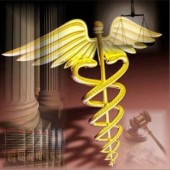Chemerinsky’s predictions on the Supreme Court’s upcoming ruling on Obamacare
by Russell's Rants
Originally published June 20, 2012
 Professor Erwin Chemerinsky, Dean of the U.C. Irvine School of Law, gave our firm a lunchtime presentation today on the Supreme Court’s docket. The topic on everyone’s mind, of course, was the Court’s upcoming ruling on the Affordable Care Act, which is expected any time.
Professor Erwin Chemerinsky, Dean of the U.C. Irvine School of Law, gave our firm a lunchtime presentation today on the Supreme Court’s docket. The topic on everyone’s mind, of course, was the Court’s upcoming ruling on the Affordable Care Act, which is expected any time.
Dean Chemerinsky wouldn’t venture a guess on the central issue in the case – whether the Court will uphold or strike down the Individual Mandate – but made some interesting observations and predictions.
His biggest prediction was that the case would either be 6-3 upholding the Act (including Justices Roberts and Kennedy in the majority along with the liberal justices) – or 5-4 striking it down (with Justice Kennedy as the swing vote along with the conservatives).
Dean Chemerinsky, only somewhat tongue-in-cheek, called it is a misnomer to refer to the presently constituted Supreme Court as the “Roberts Court.” Rather, it’s the Kennedy Court. Since John G. Roberts, Jr. became the Chief Justice, Justice Kennedy has voted with the majority well over 90% of the time. And when broken down upon ideological lines in split-decision cases over the last couple years, 75% of the time Kennedy sides with the conservatives, and only 25% with the liberals. So these statistics might make a supporter of the Affordable Care Act wary.
But the Dean pointed out that for all of the commentary on statements made at oral argument before the Supreme Court on this case, Justices Kennedy and Roberts were equally critical of the attorney representing the federal government supporting the constitutionality of the Act as they were of the attorney for the states opposing it. And if the High Court were to find the Act to be in excess of Congress’ powers under the Commerce Clause, it would be the first time since 1936 that the Court declared a federal social services program to be unconstitutional – in other words, unprecedented in the post-New Deal age.
The Dean imagined that if the Court decided to strike down the Act, it might do so narrowly, such as by chastising Congress for forcing people to engage in commerce. He stated, however, that health care is unique because the people who don’t purchase medical insurance negatively affect those who do in terms of higher premiums and availability. It’s not like broccoli, which is not indispensable and no one will provide for free if you don’t buy it yourself.
But maybe the Court won’t even reach the big Commerce Clause question. The Dean noted that the Individual Mandate acts like a tax in that its penalties for those who refuse to buy insurance are imposed based upon a percentage of income and collected by the IRS. And if a tax, then it is undisputed that Congress has the power to tax and spend for the general welfare under Article I, Section 8 of the Constitution. He was taken by an exchange between Justice Sotomayor and Paul Clement, representing the states, in which she asked whether Congress could not just impose a tax on everyone for healthcare and grant an exemption for those who procured private insurance – to which Justice Kennedy heartily inquired why the Individual Mandate was any different. Mr. Clement had no adequate response to Justice Kennedy’s question, other than to point out that the Obama Administration denied that the Act imposed a tax in its political salesmanship.
Dean Chemerinsky did predict that the Supreme Court would not find the Act to be in violation of the Anti-Injunction statute, which is an equitable remedy that may be overcome by the importance of a decision on the merits. He also predicted that if struck down, parts of the 2,700 page Act would be found severable – especially those that had nothing to do with pre-existing conditions, caps or open availability of insurance that were the quid pro quo with the insurance industry to support, and be able to afford, the Individual Mandate.
In a truly disquieting discussion, the Dean opined that the last question to be decided by the Court – whether the burden on states with regard to Medicaid funding violates the Tenth Amendment – could have huge implications for all federal grants provided to the states (e.g., existing Medicaid, No Child Left Behind, etc.), again, depending on how broadly the Justices rule should they decide to find the act unconstitutional on this ground.
The Dean’s final prediction: that the ruling would be handed down not tomorrow, but next Thursday. I wish Dean Chemerinsky would come back to our firm next week to comment once the Court actually hands down its ruling.
